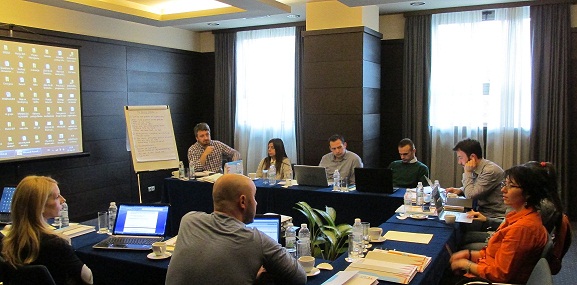8/04/2015

On 31 March – 2 April POINTPULSE Network held a second capacity building workshop in Sofia. It was discussed about the negativity of political influence on police integrity and on police anticorruption policy. Why is it important to raise the capacities of internal control mechanisms? Seven years after the joining the EU, the European Commission initiated the process of depolitizaction of Bulgarian police. Philip Gounev, advisor to the Bulgarian Minister of Interior shared their experience. “Up to the 2014 and the ‘purge’ of the police, when 300 police officers were fired, the Bulgarian police were heavily influenced either by the political parties or local businessman connected to the political parties”, said Gounev.
This process was initiated by the European Commission in 2014, which Report noted the problem of the influence of the politics on the Bulgarian police for the first time. However, the Report did not provide any recommendations on how to resolve this issue, so it was up to the new Government to develop new policies and mechanisms.
One of the main issues that arose was the lack of capacities of internal control mechanism. Bulgarian Police Inspectorate has 20 civil servants employed, while there are 50 000 people working in the Ministry of Interior. While, for example in the Belgian Police (it has around 12 000 employees) there are 150 people working in the internal affairs unit and in the UK around 400.
“Statistical chance for some local police department to be target of investigation is once in 15 years, unless deliberately targeted”, says Gounev. It is therefore important to raise the human capacities of internal affairs unit, provide them with appropriate tools for investigations.
It also very important to provide them with greater independence from the Minister of Interior, in order to be able to investigate the people that the Minister appoints.
How to develop a tool for monitoring the police corruption?
One of the main role of civil society in building police integrity is to develop innovative tools to monitor anticorruption policy. Alexander Stoyanov, Director of Research at the Bulgarian think-tank Centre for Study of Democracy (CSD) gave a presentation on CSD’s methodology instrument for monitoring anticorruption policy enforcement in the Bulgarian police.
“This instrument allows assessing whether anticorruption policies can be implemented properly. It assesses the anticorruption policies and corruption risk in recruitment, promotion, and procurement”, said Stoyanov.
Important fact for anticorruption policies is that it “should be well described, easy to follow and employees should be familiarized with them”, Stoyanov explained.
Anticorruption policies address perceived corruption risks which includes two things: “(1) internal pressure – high level of bureaucracy for a particular activity, pressure from above (from management) to break the rules and (2) external pressure – motivation of “clients” of the institution to avoid rules (e.g. “clients” of tax officials are motivated to evade taxes)”, Stoyanov explained.
Sharing knowledge among the POINTPULSE Network
Members of the POINTPULSE Network also shared their experiences in researching topics related for police corruption.
In 2014 Centre for Security Studies (CSS) conducted research on the quality of the statistical data on police corruption in BiH (16 police agencies). This was the first evidence-based research on police corruption.
Alma Kovacevic from CSS on the quality of the statistical data on police corruption in BiH
“Having good quality statistics on police corruption allows for getting the exact numbers of police officers involved in the corruption, numbers of what police does on corruption, lastly trends and comparisons”, pointed Alma Kovacevic, Project Coordinator from CSS (BiH).
In Montenegro, more than 88% of the Ministry’s budget goes to salaries and other incomes, and there are problems with overtime pay due to lack of clear procedures.
“Because of the sheer magnitude of funds allocated to the Ministry of Interior, it is necessary to have a control over procurement in the police”, said Marko Sosic, Researcher at Institute Alternativa (IA) from Montenegro.
In Kosovo, a lot of police officers failed the vetting process (security clearance). The problem with vetting is that it is being done by the Department of Vetting that is working under the Kosovo Intelligence Agency (KIA).
“Chief of the vetting unit was accused for forging documents. That is why the KCSS suggested that the body should be removed from KIA and become a part of some other body”, said Skender Perteshi, Researcher at the Kosovo Centre for Security Studies (KCSS).
The main role of police control is to ensure that police service is operating as intended, and to promote the integrity. Police officers in Serbia do not trust enough in the work of police internal control.
“29% of the police officers in Serbia think that internal control should fight police corruption, but they believe that is not capable of doing it, because of lack of capacities and political influence”, said Sasa Djordjevic, Researcher at the Belgrade Centre for Security Policy (BCSP).
Slobodan Georgiev from the Balkan Investigative Reporting Network (BIRN Serbia) in discussion regarding writing good quality policy papers which produce impact on decision-makers emphasized that “it is important to provide not only recommendations, but also solutions – what should be done in order to bring a change”.
The event is organized within the project Western Balkans Pulse for Police Integrity and Trust - POINTPULSE which is supported by the European Union through Instrument for Pre-accession Assistance (IPA) programme Civil Society Facility (CSF) EuropeAid/136-034/C/ACT/Multi. Content of the project is the sole responsibility of the BCSP and the views expressed in this document do not necessarily reflect the views of the EU. Project activities can be also followed via Twitter hashtags #BalkanCops and #POINTPULSE.